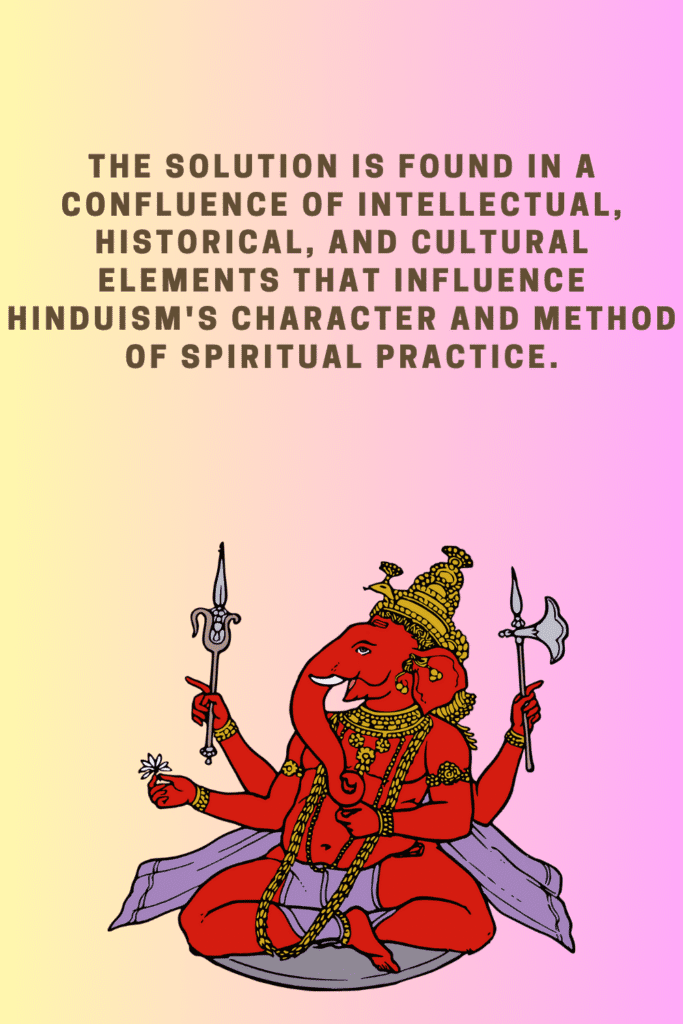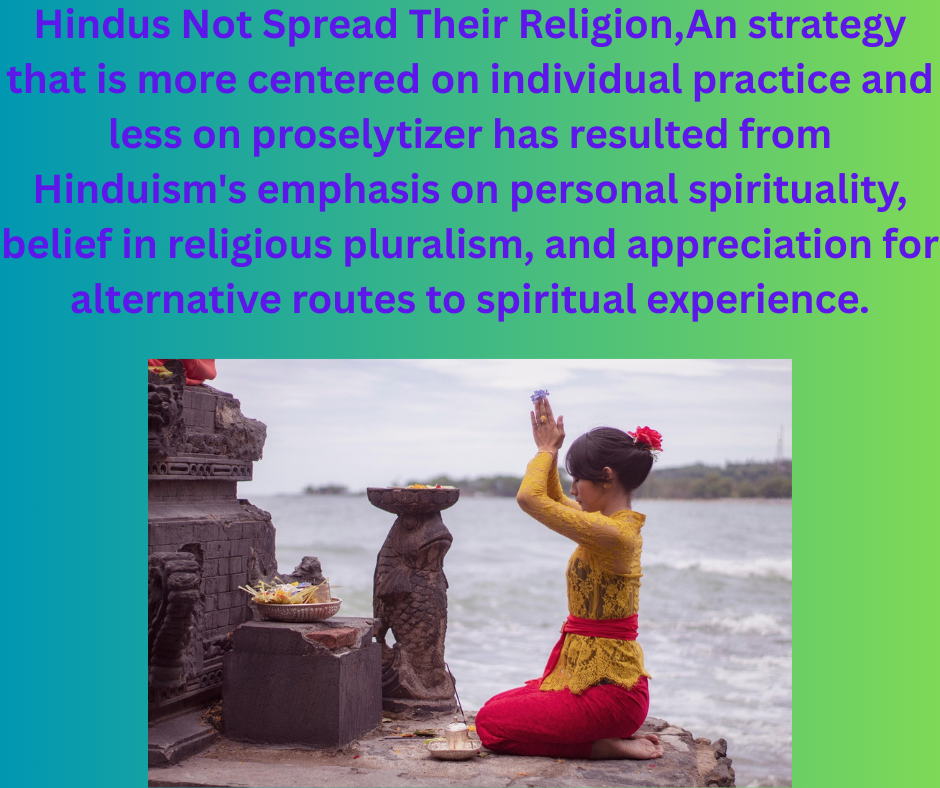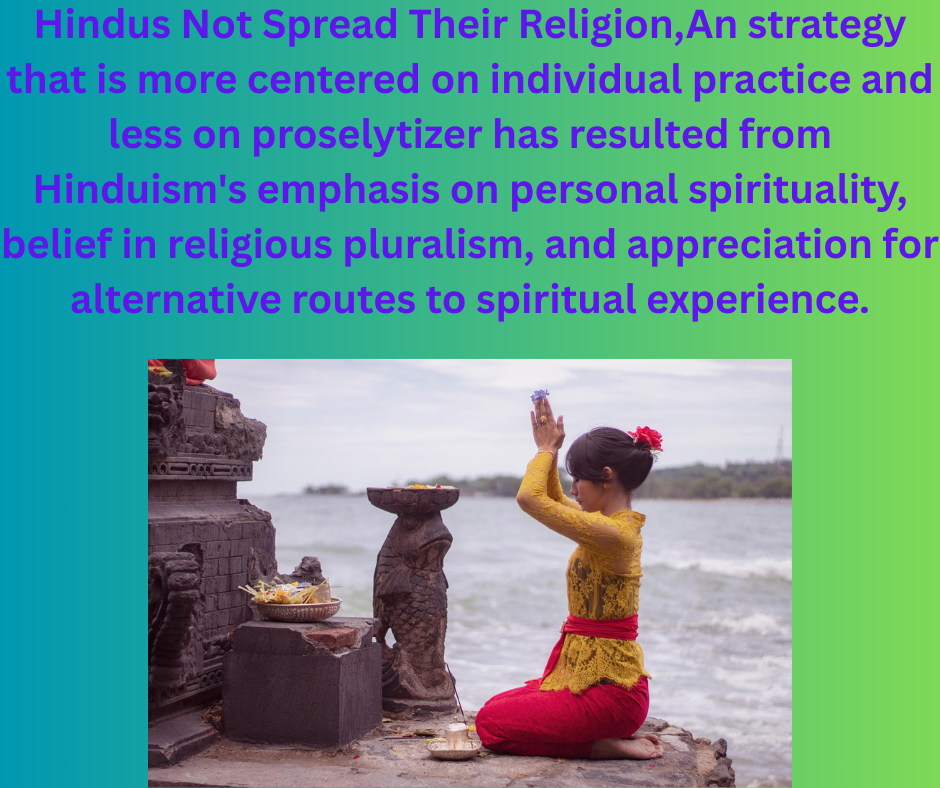Hindus Not Spread Their Religion,a prevalent aspect of many of the main world religions, such as Buddhism, Islam, and Christianity, is religious propagation, or the deliberate effort to disseminate one’s religious ideas. Throughout history, these faiths have coordinated missionary endeavors, sending followers all over the world to win people around to their way of thinking. Hinduism is a noteworthy exception to this pattern, though.

Even though Hinduism is one of the most ancient and significant religions in the world, its adherents haven’t done much to promote it outside of their home countries, especially when compared to other faiths.
Table of Contents
An intriguing question is brought up by this phenomenon: Why don’t Hindus aggressively promote their faith? The solution is found in a confluence of intellectual, historical, and cultural elements that influence Hinduism’s character and method of spiritual practice. In this post, we shall discuss the fundamental reasons why Hinduism has not historically been an evangelical or missionary religion
Hinduism’s Emphasis on Personal Spirituality
Hinduism’s emphasis on individual spirituality and self-realization is among its most fundamental features. Hinduism allows everyone to go on their own spiritual journey, in contrast to many other religions that could emphasize communal redemption or an outside savior.
According to Hindu philosophy, moksha, or emancipation, is the ultimate aim of existence and can be attained via self-awareness, meditation, devotion, and moral behavior. Hindus Not Spread Their Religion,Converting people to the religion is not necessary for this intensely personal process.
Every person has the divine (Brahman) within them, according to Hinduism, and each person must find their own way to spiritual awakening. Since each person is viewed as ultimately accountable for their own spiritual development, Hinduism becomes less focused on missionary activities as a result of this inward journey.
It also implies that, even if their pathways do not coincide with Hindu doctrine, individuals from various cultural and theological backgrounds can discover their own special routes to the holy.
Pluralism and Tolerance of Other Beliefs
Religious plurality has long been a part of Hinduism. Hindu philosophy recognizes that there are numerous ways to reach the divine and that various persons may have varied experiences with spiritual truth.
According to the Rig Veda, “Ekam Sat Vipra Bahudha Vadanti” means “Truth is one, but the wise call it by many names.” This worldview places a strong emphasis on the idea that, despite their potential variations, all faiths ultimately lead to the same ultimate reality.
This welcoming attitude makes Hindus see no need to convert others. Within Hinduism, there is a common conviction that all religions are legitimate routes to truth. Hindus Not Spread Their Religion,Hinduism does not perceive the need to force its ideas on others or try to convert non-Hindus, even though it may encourage people to follow its spiritual disciplines.
Hindus are more tolerant of diverse belief systems as a result of their philosophical openness, acknowledging that individuals may approach the divine in many ways.
Historical Context: Hinduism’s Self-Sufficiency
Hinduism has traditionally been a religion that is mostly practiced on the Indian subcontinent. It didn’t feel the need to spread outside of its geographic area for thousands of years. The people of India, the country where Hinduism originated, have historically practiced and upheld the faith. Hindus Not Spread Their Religion,Hinduism may have been more active in missionary endeavors since it was not as challenged by rival religions as some other faiths have been.
Furthermore, India’s social and cultural systems have long been entwined with Hinduism. It gradually became intricately woven into the people’s daily lives, customs, and culture. Hinduism was ingrained in Indian culture rather than existing as an alien religion that had to be spread.
As a result, organized missionary work lacked momentum. It’s also crucial to remember that, rather than through forceful proselytization, Hinduism naturally expanded throughout Asia, including Southeast Asia, Indonesia, and portions of Central Asia, through trade, cultural interaction, and population mobility. Over ages, Hindu concepts, artwork, and customs naturally spread due to influence rather than conversion efforts.
Reluctance Toward Proselytization Due to Caste and Social Hierarchies
Despite being contentious and officially outlawed in contemporary India, the caste system of Hinduism historically caused social divisions that hampered proselytization. Hindu society was hierarchical, with distinct roles and functions assigned to each caste. Numerous caste-based divisions were engrained in religious doctrine and practice.

Lower castes or “untouchables” were occasionally denied access to holy texts or religious rituals. As a result, outsiders and people from different social classes were not always accepted or included in Hinduism. Hindus Not Spread Their Religion,The idea of a spiritual hierarchy and social barriers may have hindered attempts to spread the faith.
Although there were reform groups within Hinduism that contested these social institutions, there were not many systematic, extensive attempts at proselytizer because of the caste system’s historical influence on Hindu customs.
Furthermore, it could be difficult for non-Hindus to comprehend the intricate rituals and teachings of the religion. Some Hindus may feel that their religion should be understood and practiced within the context of their own lives rather than as something that should be taught or imposed on others.
Hinduism’s Focus on Dharma and Karma
Dharma, or the moral and ethical obligations that every person must uphold, is highly valued in Hinduism. These responsibilities are seen to be essential to preserving harmony and balance in the cosmos. Hindus Not Spread Their Religion,Dharma is a highly individualized idea that can change based on a person’s age, caste, gender, and stage of life. As a result, people are less inclined to force others to follow their own dharma, particularly if it leads them down alternative spiritual pathways.
Likewise, the idea of karma, also known as the law of cause and effect, implies that people’s deeds have repercussions both in this life and the next. Hindus hold that a person’s acts and intentions determine their spiritual path, and that conversion or proselytizer may not always be in line with the law of karma.
There is more emphasis on living one’s own life in line with dharma and letting others do the same in accordance with their own spiritual needs and experiences than there is on persuading people to convert to Hinduism.
Globalization and the Emergence of New Religious Movements
The emergence of new religious movements like the International Society for Krishna Consciousness (ISKCON) and the popularity of yoga and meditation techniques have helped Hinduism become more globalized in recent years. Hindus Not Spread Their Religion,Though they don’t often aim to convert individuals in the conventional sense, these movements have introduced Hindu teachings to a larger audience, especially in Western nations.
Rather, these movements offer a wider audience access to aspects of Hindu philosophy, especially the ideas of karma, dharma, and devotion, allowing individuals to study these ideas without necessarily becoming Hindus.
For instance, yoga and meditation, which have their roots in Hindu traditions, are spiritual or wellness practices that are practiced by individuals all around the world. This provides a means for individuals to interact with Hindu philosophy without having to formally become Hindus. Though they do not actively convert people to the religion as traditional missionary endeavors could, such rituals have contributed to the global dissemination of Hindu beliefs.
The Philosophical Viewpoint: Freedom of Belief
At its core, Hinduism is a religion that cherishes spiritual liberty and the notion that every person is free to follow their own spiritual path. Hindus Not Spread Their Religion,This viewpoint stems from the conviction that every person is traveling a different path to spiritual enlightenment. As a result, there isn’t a general desire to convert people or persuade them to become Hindu.
Rather, there is a great regard for each person’s autonomy and personal choice in choosing their spiritual path. Hindus frequently see their faith as one that provides spiritual guidance and resources, rather than one that forces its ideas on others.
Conclusion
In conclusion, Hindus have not traditionally attempted to use extensive missionary work to propagate their faith for a number of reasons. These explanations have their roots in Hinduism’s philosophy, social institutions, and historical background. Hindus Not Spread Their Religion,An strategy that is more centered on individual practice and less on proselytizer has resulted from Hinduism’s emphasis on personal spirituality, belief in religious pluralism, and appreciation for alternative routes to spiritual experience.
Furthermore, a more passive attitude to religion and conversion has been facilitated by Hinduism’s organic growth throughout Asia, its intricate social systems, and its stress on karma and dharma.
